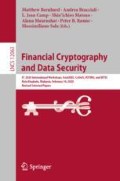Abstract
While it is often claimed that users are empowered via online technologies, there is also a general feeling of privacy dis-empowerment. We investigate the perception of privacy and sharing empowerment online, as well as the use of privacy technologies, via a cross-national online study with N = 907 participants. We find that perception of privacy empowerment differs from that of sharing across dimensions of meaningfulness, competence and choice. We find similarities and differences in privacy method preference between the US, UK and Germany. We also find that non-technology methods of privacy protection are among the most preferred methods, while more advanced and standalone privacy technologies are least preferred. By mapping the perception of privacy dis-empowerment into patterns of privacy behavior online, and clarifying the similarities and distinctions in privacy technology use, this paper provides an important foundation for future research and the design of privacy technologies. The findings may be used across disciplines to develop more user-centric privacy technologies, that support and enable the user.
Access this chapter
Tax calculation will be finalised at checkout
Purchases are for personal use only
References
Abu-Salma, R., Sasse, M.A., Bonneau, J., Danilova, A., Naiakshina, A., Smith, M.: Obstacles to the adoption of secure communication tools. In: 2017 IEEE Symposium on Security and Privacy (SP), pp. 137–153. IEEE (2017)
Aguinis, H., Pierce, C.A., Culpepper, S.A.: Scale coarseness as a methodological artifact: correcting correlation coefficients attenuated from using coarse scales. Organ. Res. Methods 12(4), 623–652 (2009)
Benenson, Z., Girard, A., Krontiris, I.: User acceptance factors for anonymous credentials: an empirical investigation. In: WEIS (2015)
Chimi, C.J., Russell, D.L.: The likert scale: a proposal for improvement using quasi-continuous variables. In: Information Systems Education Conference, Washington, DC, pp. 1–10 (2009)
Cook, C., Heath, F., Thompson, R.L., Thompson, B.: Score reliability in webor internet-based surveys: unnumbered graphic rating scales versus likert-type scales. Educ. Psychol. Measur. 61(4), 697–706 (2001)
Coopamootoo, K.P.L.: Towards empowering the human for privacy online. In: Kosta, E., Pierson, J., Slamanig, D., Fischer-Hübner, S., Krenn, S. (eds.) Privacy and Identity 2018. IAICT, vol. 547, pp. 67–80. Springer, Cham (2019). https://doi.org/10.1007/978-3-030-16744-8_5
Coopamootoo, K.P.L., Groß, T.: Evidence-based methods for privacy and identity management. In: Lehmann, A., Whitehouse, D., Fischer-Hübner, S., Fritsch, L., Raab, C. (eds.) Privacy and Identity 2016. IAICT, vol. 498, pp. 105–121. Springer, Cham (2016). https://doi.org/10.1007/978-3-319-55783-0_9
Coopamootoo, K.P.L., Groß, T.: Cyber security and privacy experiments: a design and reporting toolkit. In: Hansen, M., Kosta, E., Nai-Fovino, I., Fischer-Hübner, S. (eds.) Privacy and Identity 2017. IAICT, vol. 526, pp. 243–262. Springer, Cham (2018). https://doi.org/10.1007/978-3-319-92925-5_17
Coopamootoo, K.P., Groß, T.: Why privacy is all but forgotten - an empirical study of privacy and sharing attitude. In: Proceedings on Privacy Enhancing Technologies, vol. 4, pp. 39–60 (2017)
Harborth, D., Pape, S.: Examining technology use factors of privacy-enhancing technologies: the role of perceived anonymity and trust (2018)
Kraimer, M.L., Seibert, S.E., Liden, R.C.: Psychological empowerment as a multidimensional construct: A test of construct validity. Educ. Psychol. Measur. 59(1), 127–142 (1999)
Mansell, R.: Empowerment and/or disempowerment: the politics of digital media. Popul. Commun. 12(4), 223–236 (2014)
Menon, S.T.: Psychological empowerment: definition, measurement, and validation. Can. J. Behav. Sci./Revue canadienne des sciences du comportement 31(3), 161 (1999)
Nikiforakis, N., Kapravelos, A., Joosen, W., Kruegel, C., Piessens, F., Vigna, G.: Cookieless monster: exploring the ecosystem of web-based device fingerprinting. In: 2013 IEEE Symposium on Security and Privacy, pp. 541–555. IEEE (2013)
O’Hara, K., Tuffield, M.M., Shadbolt, N.: Lifelogging: privacy and empowerment with memories for life. Identity Inf. Soc. 1(1), 155–172 (2008). https://doi.org/10.1007/s12394-009-0008-4
Peer, E., Brandimarte, L., Samat, S., Acquisti, A.: Beyond the turk: alternative platforms for crowdsourcing behavioral research. J. Exp. Soc. Psychol. 70, 153–163 (2017)
Pierson, J.: Online privacy in social media: a conceptual exploration of empowerment and vulnerability. Commun. Strat. 88, 99–120 (2012)
Rainie, L., et al.: Anonymity, privacy, and security online. Pew Res. Center 5 (2013)
Seibert, S.E., Wang, G., Courtright, S.H.: Antecedents and consequences of psychological and team empowerment in organizations: a meta-analytic review (2011)
Spreitzer, G.M.: Psychological empowerment in the workplace: dimensions, measurement, and validation. Acad. Manag. J. 38(5), 1442–1465 (1995)
Thomas, K.W., Velthouse, B.A.: Cognitive elements of empowerment: an interpretive model of intrinsic task motivation. Acad. Manag. Rev. 15(4), 666–681 (1990)
Van Dyke, T.P., Midha, V., Nemati, H.: The effect of consumer privacy empowerment on trust and privacy concerns in e-commerce. Electron. Mark. 17(1), 68–81 (2007)
Wewers, M.E., Lowe, N.K.: A critical review of visual analogue scales in the measurement of clinical phenomena. Res. Nurs. Health 13(4), 227–236 (1990)
Author information
Authors and Affiliations
Corresponding author
Editor information
Editors and Affiliations
7 Appendix
7 Appendix
Rights and permissions
Copyright information
© 2020 Springer Nature Switzerland AG
About this paper
Cite this paper
Coopamootoo, K.P.L. (2020). Dis-Empowerment Online: An Investigation of Privacy-Sharing Perceptions and Method Preferences. In: Bernhard, M., et al. Financial Cryptography and Data Security. FC 2020. Lecture Notes in Computer Science(), vol 12063. Springer, Cham. https://doi.org/10.1007/978-3-030-54455-3_6
Download citation
DOI: https://doi.org/10.1007/978-3-030-54455-3_6
Published:
Publisher Name: Springer, Cham
Print ISBN: 978-3-030-54454-6
Online ISBN: 978-3-030-54455-3
eBook Packages: Computer ScienceComputer Science (R0)

